|
|
|
Sort Order |
|
|
|
Items / Page
|
|
|
|
|
|
|
| Srl | Item |
| 1 |
ID:
145283
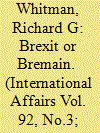

|
|
|
|
|
| Summary/Abstract |
A major public debate on the costs and benefits of the United Kingdom's membership of the European Union is presently under way. The outcome of the referendum on 23 June 2016 will be a pivotal moment in determining whether the EU has a future as a component of the UK's European diplomatic strategy or whether there is a major recalibration of how the UK relates to Europe and more widely of its role within international relations. Since accession to the European Economic Community the UK has evolved an uncodified, multipronged European diplomatic strategy. This has involved the UK seeking to reinforce its approach of shaping the security of the continent, preserving a leading diplomatic role for the UK in managing the international relations of Europe, and to maximize British trade and investment opportunities through a broadening and deepening of Europe as an economically liberal part of the global political economy. Since accession the UK's European diplomatic strategy has also been to use membership of the EU to facilitate the enhancement of its international influence, primarily as a vehicle for leveraging and amplifying broader national foreign and security policy objectives. The strategy has been consistent irrespective of which party has formed the government in the UK. Increasing domestic political difficulties with the process of European integration have now directly impacted on this European strategy with a referendum commitment. Whether a vote for a Brexit or a Bremain, the UK will be confronted with challenges for its future European strategy.
|
|
|
|
|
|
|
|
|
|
|
|
|
|
|
|
| 2 |
ID:
145293


|
|
|
|
|
| Summary/Abstract |
This review article considers a variety of artworks, including stories, poems, plays, photographs and films, to explore what ‘drone art’ or ‘drone aesthetics’ can tell us about the politics and ethics of drone operations or drone warfare. The article finds that the politics and the ethics are troublesome and troubling; and that the art illuminates some important issues, through the focus on the drone pilot or operator, and, more fundamentally, through the exposure of what has been called an ‘empathy gap’. The attention paid to the drone operator is admirable, as far as it goes. It has unquestionably served to demystify drone operations, and in a certain sense to humanize drone warfare. Democracy is founded upon visibility. To see the drone, it will be necessary to capture it, and contemplate it, from different points of view.
|
|
|
|
|
|
|
|
|
|
|
|
|
|
|
|
| 3 |
ID:
145284


|
|
|
|
|
| Summary/Abstract |
The reform of the eurozone and the concerns surrounding a potential ‘Brexit’ has given rise to a new debate about differentiation but also disintegration in the European Union. This article provides a theoretical and analytical approach to understanding how differentiation is related to the debate on distribution of competences across various levels government. It finds that differentiation has played an important role in the EU integration process since the 1950s, even though the risk of fragmentation has always existed. Facing the benefits and costs of differentiation, the member states have developed their own practices. Three ideosyncratic groups of member states can be identified in this regard: first, a group of Anglo-Scandinavian member states which refuse centralization of the EU; a Franco-German group which considers the integration through the promotion of a ‘core Europe’; and, third, a group of central and east European member states who fear that differentiation would set their interests aside and relegate them to second-class status within the EU. Finally, Brexit is not only about the status of the UK in the EU, but casts deeper questions on how to clarify the nature of relations between the eurozone and the EU as a whole.
|
|
|
|
|
|
|
|
|
|
|
|
|
|
|
|
| 4 |
ID:
145291


|
|
|
|
|
| Summary/Abstract |
This article examines the Egyptian Muslim Brotherhood (MB) movement's stand on the South Sudan question. The aim here is to contribute to the ongoing debate over the MB's moderation. Throughout the civil war in Sudan, the MB consistently objected to South Sudanese secession. Yet, while it had traditionally framed its objection in religious terms, describing the South Sudanese struggle as a Christian conspiracy against Islam, in the decade preceding South Sudan's declaration of independence it moved to base its opposition on more practical grounds, revolving around issues such the absence of democracy, stability and infrastructure in South Sudan. This correlated with wider shifts in the MB. Since the 1990s, the movement has claimed to have undergone a transformation, adopting a moderate, pro-democratic stance. These statements persuaded many scholars that the MB has come to represent political moderation in both its domestic and international agenda. More recent works on the movement, however, have come to question the MB's moderation hypothesis, suggesting that even though the movement has changed its discourse and some aspects of its activism, this could not be seen as a linear process of moderation. This article uses the South Sudan case to further support this critique from a foreign policy perspective. It demonstrates that even though the MB changed its tactics and discourse, its goals remained unchanged— even when the circumstances and the normative environment changed dramatically. Moreover, it shows that at times of crisis, the liberal discourse gave way to the old-fashioned radical discourse of previous decades.
|
|
|
|
|
|
|
|
|
|
|
|
|
|
|
|
| 5 |
ID:
145288
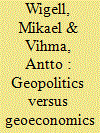

|
|
|
|
|
| Summary/Abstract |
Geopolitics and geoeconomics are often addressed together, with the latter seen as a sub-variant of the former. This article shows the usefulness of differentiating them at a conceptual level. By juxtaposing traditional geopolitics and geoeconomics, we suggest that they have remarkably different qualities and implications for their targets, on both national and international levels. Importantly, these include the formation of alliances, and whether they are driven by balancing, bandwagoning or underbalancing dynamics. An analysis of Russia's shifting geostrategy towards Europe shows these differences in practice. Russian geoeconomics has long been successful as a ‘wedge strategy’, dividing the EU. As a result, the EU has underbalanced and its Russia policies have been incoherent. The observable tendencies in 2014–15 towards a more coherent European approach can be explained by the changing emphasis in Russia's geostrategy. Russia's turn to geopolitics works as a centripetal force, causing a relative increase in EU unity. Centripetal tendencies due to heightened threat perception can be observed in the economic sanctions, emerging German leadership in EU foreign policy, and discussion on energy union. The analysis calls for more attention to the way strategic choices—geopolitics versus geoeconomics—affect the coherence of threatened states and alliance patterns.
|
|
|
|
|
|
|
|
|
|
|
|
|
|
|
|
| 6 |
ID:
145290


|
|
|
|
|
| Summary/Abstract |
For years, mounting instability had led many to predict the imminent collapse of Yemen. These forecasts became reality in 2014 as the country spiralled into civil war. The conflict pits an alliance of the Houthis, a northern socio-political movement that had been fighting the central government since 2004, alongside troops loyal to a former president, Ali Abdullah Saleh, against supporters and allies of the government overthrown by the Houthis in early 2015. The war became regionalized in March 2015 when a Saudi Arabia-led coalition of ten mostly Arab states launched a campaign of air strikes against the Houthis. According to Saudi Arabia, the Houthis are an Iranian proxy; they therefore frame the war as an effort to counter Iranian influence. This article will argue, however, that the Houthis are not Iranian proxies; Tehran's influence in Yemen is marginal. Iran's support for the Houthis has increased in recent years, but it remains low and is far from enough to significantly impact the balance of internal forces in Yemen. Looking ahead, it is unlikely that Iran will emerge as an important player in Yemeni affairs. Iran's interests in Yemen are limited, while the constraints on its ability to project power in the country are unlikely to be lifted. Tehran saw with the rise of the Houthis a low cost opportunity to gain some leverage in Yemen. It is unwilling, however, to invest larger amounts of resources. There is, as a result, only limited potential for Iran to further penetrate Yemen.
|
|
|
|
|
|
|
|
|
|
|
|
|
|
|
|
| 7 |
ID:
145287
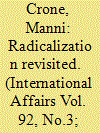

|
|
|
|
|
| Summary/Abstract |
For more than a decade, ‘radicalization’ has been a keyword in our understanding of terrorism. From the outset, radicalization was conceived of as an intellectual process through which an individual would increasingly come under a spell of extremist ideas. This ideological understanding of radicalization still prevails. In a 2015 speech on extremism, British Prime Minister David Cameron, for instance, claimed that the ‘root cause of the threat we face is the extremist ideology itself’. But the way we understand radicalization has specific consequences for the way we manage and fight the scourge of terrorism. Considering recent events, including the November 2015 Paris attacks, the present article sets out to reassess the above-mentioned intellectualist understanding of radicalization and come up with new suggestions as to how radicalization may be understood today. Initially, the article suggests that ideology is not necessarily a precondition for violence, but that a prior experience with violence is more often a precondition for engaging an extremist ideology. Such experience with violence can be both domestic and international, obtained in Europe or Syria and other conflict zones. In the second part of the article it is argued that although radicalization is often conceived of as an individual process, pathways towards terrorism are inherently social and political. Finally, the article argues that by stressing the importance of ideology and ideological processes, concepts of radicalization have abstracted away from another factor that is pivotal for understanding pathways towards terrorist violence: the skills and capacities of the body.
|
|
|
|
|
|
|
|
|
|
|
|
|
|
|
|
| 8 |
ID:
145285


|
|
|
|
|
| Summary/Abstract |
A British exit from the EU would add to growing strains on the United States’ relations with Britain and the rest of Europe, but by itself would not lead to a breakdown in transatlantic relations due to the scale of shared ideas and interests, institutional links, international pressures and commitments by individual leaders. It would, however, add to pressures on the US that could change the direction of the transatlantic relationship. From the perspective of Washington, Britain risks becoming an awkward inbetweener, beholden more than ever before to a wider transatlantic relationship where the US and EU are navigating the challenges of an emerging multipolar world. The article outlines developments in the UK, EU, Europe and the US in order to explain what Brexit could mean for the United States’ approaches to transatlantic relations. By doing so the article moves beyond a narrow view of Brexit and transatlantic relations that focuses on the future of UK–US relations. In the conclusion we map out several ways in which US views of the transatlantic relationship could be changed.
|
|
|
|
|
|
|
|
|
|
|
|
|
|
|
|
| 9 |
ID:
145286


|
|
|
|
|
| Summary/Abstract |
Whether a ‘Brexit’ would threaten the United Kingdom's national security has become a central theme in the run-up to the in/out referendum on EU membership. Although national security has been a central facet of both the ‘Remain’ and ‘Leave’ campaigns thus far, there has been little mention of the implications of a Brexit for UK defence industries or defence procurement, let alone formal debate or analysis. The article addresses this gap by analysing the potential implications of a Brexit for defence procurement and industries in the UK and the EU member states. The first section analyses the policy context for a Brexit by exploring existing levels of EU defence procurement integration in the UK's and Europe's defence industries. The second section draws on Jozef Bátora's ‘institutional logics’ framework to identify two pro-Brexit and two pro-Remain narratives, each employing differing assumptions on the relative benefits of national sovereignty and closer EU integration The final section analyses the way in which these ‘logics’ or narratives will be deployed by their advocates in the run-up to the UK's EU referendum. The article concludes that the national security battleground in the 2016 referendum will be fought over competing narratives and arguments, partly because there is a dearth of data and evidence concerning UK and EU defence procurement and industries, which renders this crucial area of national security vulnerable to the politics of spin.
|
|
|
|
|
|
|
|
|
|
|
|
|
|
|
|
| 10 |
ID:
145292
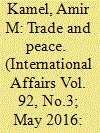

|
|
|
|
|
| Summary/Abstract |
This article examines the effectiveness of the EU's use of trade to induce peace in Libya during Gaddafi's final ten years in power, between 2001 and 2011. During this period, the EU implored and reiterated through rhetoric, policy and the exchange of goods and services that trade was to be used as a tool to maintain peace and prevent conflict. Indeed, this peace-through-trade assumption is at the heart of the EU, which was founded on the notion that economic interdependence ameliorates potential causes of conflict. Initially, this article embeds its argument in the theory concerned with the relationship between trade and peace, followed by tracking the development of the EU's policy. The main body of the article then provides evidence which goes against the assumption that the trade–peace relationship is positively correlated. Specifically, it is argued that the EU's peace-through-trade policy failed in this instance due to the fact that it failed to take into account the Libyan context: namely, the Middle Eastern state's ethnographic and historical makeup; the weapons of mass-destruction programme and the subsequently induced sanctions; Gaddafi's rule and attempts at reform; as well as the 2011 conflict. All these factors amalgamated to ongoing conflict in Libya during Gaddafi's final decade in power despite EU–Libyan trade continuing to take place during this timeframe.
|
|
|
|
|
|
|
|
|
|
|
|
|
|
|
|
| 11 |
ID:
145289
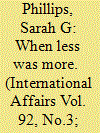

|
|
|
|
|
| Summary/Abstract |
The internationally unrecognized ‘Republic of Somaliland’ presents a case in which the domestic drivers of peace and development may be examined when aid and other forms of international intervention are not significant variables. The relative autonomy of its peace process offers an alternative perspective on post-conflict transitions to that offered in the majority of the literature, which instead problematizes either the perverse outcomes or unintended consequences of international interventions in conflict-affected areas. The purpose of this article is not to establish the salience of Somaliland's relative isolation in its ability to achieve peace and relative political order, as this is already documented in the literature. Rather, it explores the ways in which that isolation fostered mutual dependence between powerful political and economic actors for their survival and prosperity. It uses a political settlements framework to probe the implications of this dependence for western statebuilding interventions in post-conflict situations. The findings present a challenge to orthodox assumptions about how states transition out of conflict, particularly that: greater vertical inclusivity necessarily strengthens a political settlement; effective Weberian institutions are a prerequisite of an enduring peace; and that external assistance is usually necessary to end large-scale violence in developing states or to prevent a recurrence of the conflict.
|
|
|
|
|
|
|
|
|
|
|
|
|
|
|
|
|
|
|
|
|